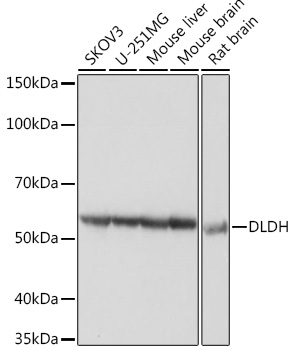Anti-DLDH Antibody (CAB5220)
- SKU:
- CAB5220
- Product type:
- Antibody
- Reactivity:
- Human
- Reactivity:
- Mouse
- Reactivity:
- Rat
- Host Species:
- Rabbit
- Isotype:
- IgG
- Research Area:
- Cell Biology
Description
| 抗体名: | Anti-DLDH Antibody |
| 抗体コード: | CAB5220 |
| 抗体サイズ: | 20uL, 50uL, 100uL |
| 申し込み: | WB IHC IF |
| 反応性: | Human, Mouse, Rat |
| 宿主種: | Rabbit |
| 免疫原: | A synthesized peptide derived from human DLDH |
| 申し込み: | WB IHC IF |
| 推奨希釈: | WB 1:500 - 1:2000 IHC 1:50 - 1:200 IF 1:50 - 1:200 |
| 反応性: | Human, Mouse, Rat |
| ポジティブサンプル: | SKOV3, U-251MG, Mouse liver, Mouse brain, Rat brain |
| 免疫原: | A synthesized peptide derived from human DLDH |
| 精製方法: | Affinity purification |
| ストレージバッファ: | Store at -20'C. Avoid freeze / thaw cycles. Buffer: PBS with 0.02% sodium azide, 0.05% BSA, 50% glycerol, pH7.3. |
| アイソタイプ: | IgG |
| 順序: | Email for sequence |
| 遺伝子ID: | 1738 |
| Uniprot: | P09622 |
| セルラーロケーション: | |
| 計算された分子量: | 56kDa |
| 観察された分子量: | 60KDa |
| 同義語: | DLDD, DLDH, E3, GCSL, LAD, PHE3 |
| バックグラウンド: | This gene encodes a member of the class-I pyridine nucleotide-disulfide oxidoreductase family. The encoded protein has been identified as a moonlighting protein based on its ability to perform mechanistically distinct functions. In homodimeric form, the encoded protein functions as a dehydrogenase and is found in several multi-enzyme complexes that regulate energy metabolism. However, as a monomer, this protein can function as a protease. Mutations in this gene have been identified in patients with E3-deficient maple syrup urine disease and lipoamide dehydrogenase deficiency. Alternative splicing results in multiple transcript variants. [provided by RefSeq, Jan 2014] |
| UniProt Protein Function: | DLD: a multi-functional mitochondrial enzyme. An enzymatic component of the mitochondrial glycine cleavage system, the pyruvate dehydrogenase complex (PDHC), the alpha-ketoglutarate dehydrogenase complex, and the branched-chain alpha-keto acide dehydrogenase complex. Is the E3 component of the PDHC that catalyzes the overall conversion of pyruvate to acetyl-CoA and CO2. The E3 component has dihydrolipoamide dehydrogenase activity. The PDHC contains 20-30 copies of pyruvate decarboxylase tetramers (2 alpha:2 beta)(E1), 60 copies of dihydrolipoamide acetyltransferase (E2), six homodimers of dihydrolipoamide dehydrogenase (E3), plus E3 binding proteins. Defects in DLD are a cause of maple syrup urine disease (MSUD), characterized by mental and physical retardation, feeding problems and a maple syrup odor to the urine. The keto acids of the branched-chain amino acids are present in the urine, resulting from a block in oxidative decarboxylation. Differentially expressed in the Wernicke's Area from patients with schizophrenia. Inhibited by 5-methoxyindole-2-carboxylic acid (MICA). |
| UniProt Protein Details: | Protein type:Amino Acid Metabolism - glycine, serine and threonine; Amino Acid Metabolism - valine, leucine and isoleucine degradation; Oxidoreductase; Carbohydrate Metabolism - glycolysis and gluconeogenesis; Mitochondrial; EC 1.8.1.4; Carbohydrate Metabolism - pyruvate; Carbohydrate Metabolism - citrate (TCA) cycle Chromosomal Location of Human Ortholog: 7q31-q32 Cellular Component: nucleoplasm; mitochondrion; mitochondrial matrix; acrosomal matrix; cilium Molecular Function:mercury (II) reductase activity; FAD binding; mercury ion binding; dihydrolipoyl dehydrogenase activity; NADP binding Biological Process: cellular metabolic process; regulation of membrane potential; mitochondrial electron transport, NADH to ubiquinone; cell redox homeostasis; tricarboxylic acid cycle; detoxification of mercury ion; lysine catabolic process; regulation of acetyl-CoA biosynthetic process from pyruvate; gastrulation; branched chain family amino acid catabolic process; proteolysis; pyruvate metabolic process; sperm capacitation Disease: Dihydrolipoamide Dehydrogenase Deficiency |
| NCBI Summary: | This gene encodes a member of the class-I pyridine nucleotide-disulfide oxidoreductase family. The encoded protein has been identified as a moonlighting protein based on its ability to perform mechanistically distinct functions. In homodimeric form, the encoded protein functions as a dehydrogenase and is found in several multi-enzyme complexes that regulate energy metabolism. However, as a monomer, this protein can function as a protease. Mutations in this gene have been identified in patients with E3-deficient maple syrup urine disease and lipoamide dehydrogenase deficiency. Alternative splicing results in multiple transcript variants. [provided by RefSeq, Jan 2014] |
| UniProt Code: | P09622 |
| NCBI GenInfo Identifier: | 269849557 |
| NCBI Gene ID: | 1738 |
| NCBI Accession: | P09622.2 |
| UniProt Secondary Accession: | P09622,Q14131, Q14167, Q59EV8, Q8WTS4, B2R5X0, B4DHG0 B4DT69, |
| UniProt Related Accession: | P09622 |
| Molecular Weight: | 509 |
| NCBI Full Name: | Dihydrolipoyl dehydrogenase, mitochondrial |
| NCBI Synonym Full Names: | dihydrolipoamide dehydrogenase |
| NCBI Official Symbol: | DLD |
| NCBI Official Synonym Symbols: | E3; LAD; DLDD; DLDH; GCSL; PHE3 |
| NCBI Protein Information: | dihydrolipoyl dehydrogenase, mitochondrial; diaphorase; lipoamide reductase; lipoamide dehydrogenase; glycine cleavage system L protein; glycine cleavage system protein L; E3 component of pyruvate dehydrogenase complex, 2-oxo-glutarate complex, branched chain keto acid dehydrogenase complex |
| UniProt Protein Name: | Dihydrolipoyl dehydrogenase, mitochondrial |
| UniProt Synonym Protein Names: | Dihydrolipoamide dehydrogenase; Glycine cleavage system L protein |
| Protein Family: | Delta-like protein |
| UniProt Gene Name: | DLD |
| UniProt Entry Name: | DLDH_HUMAN |


